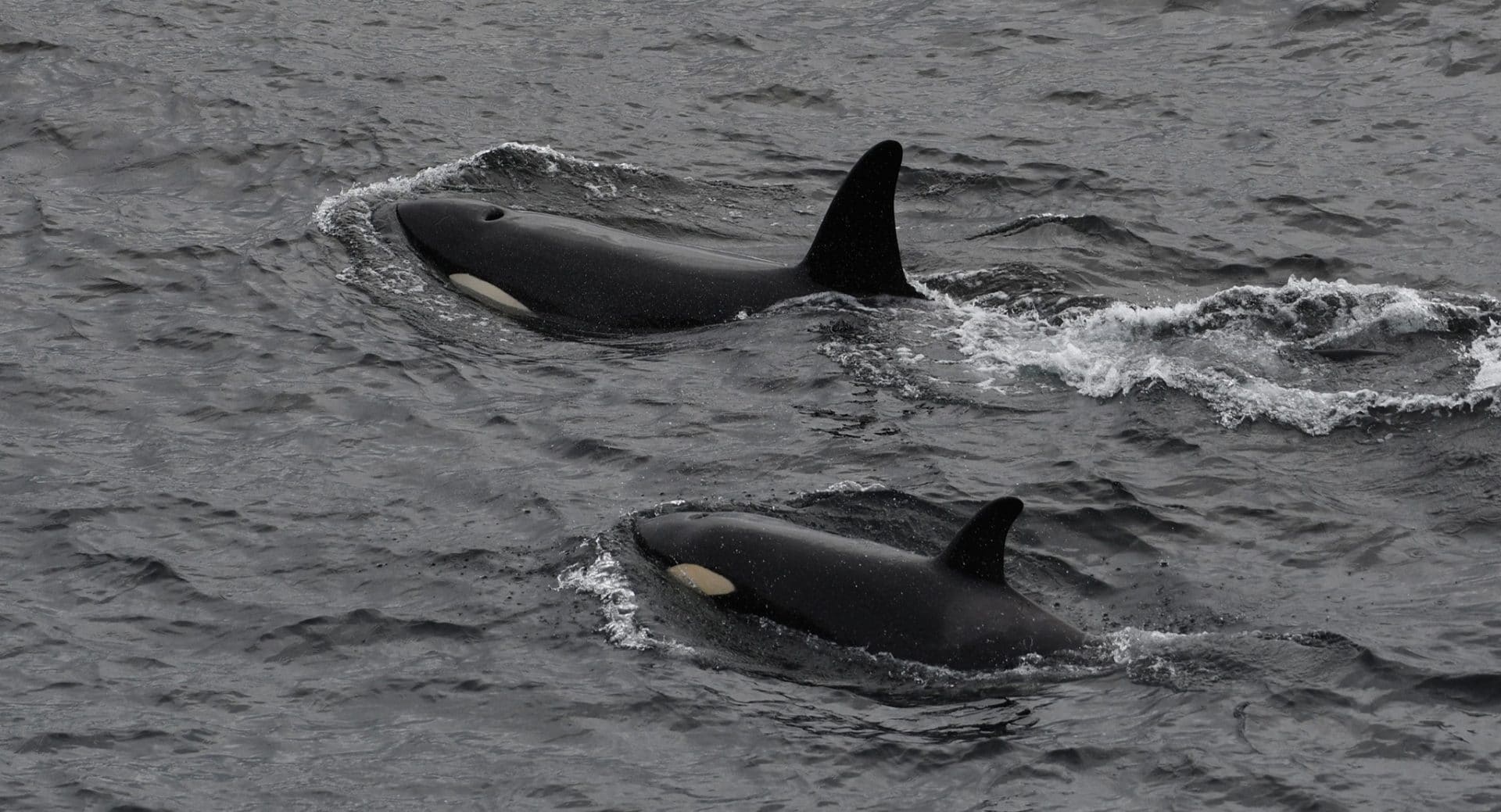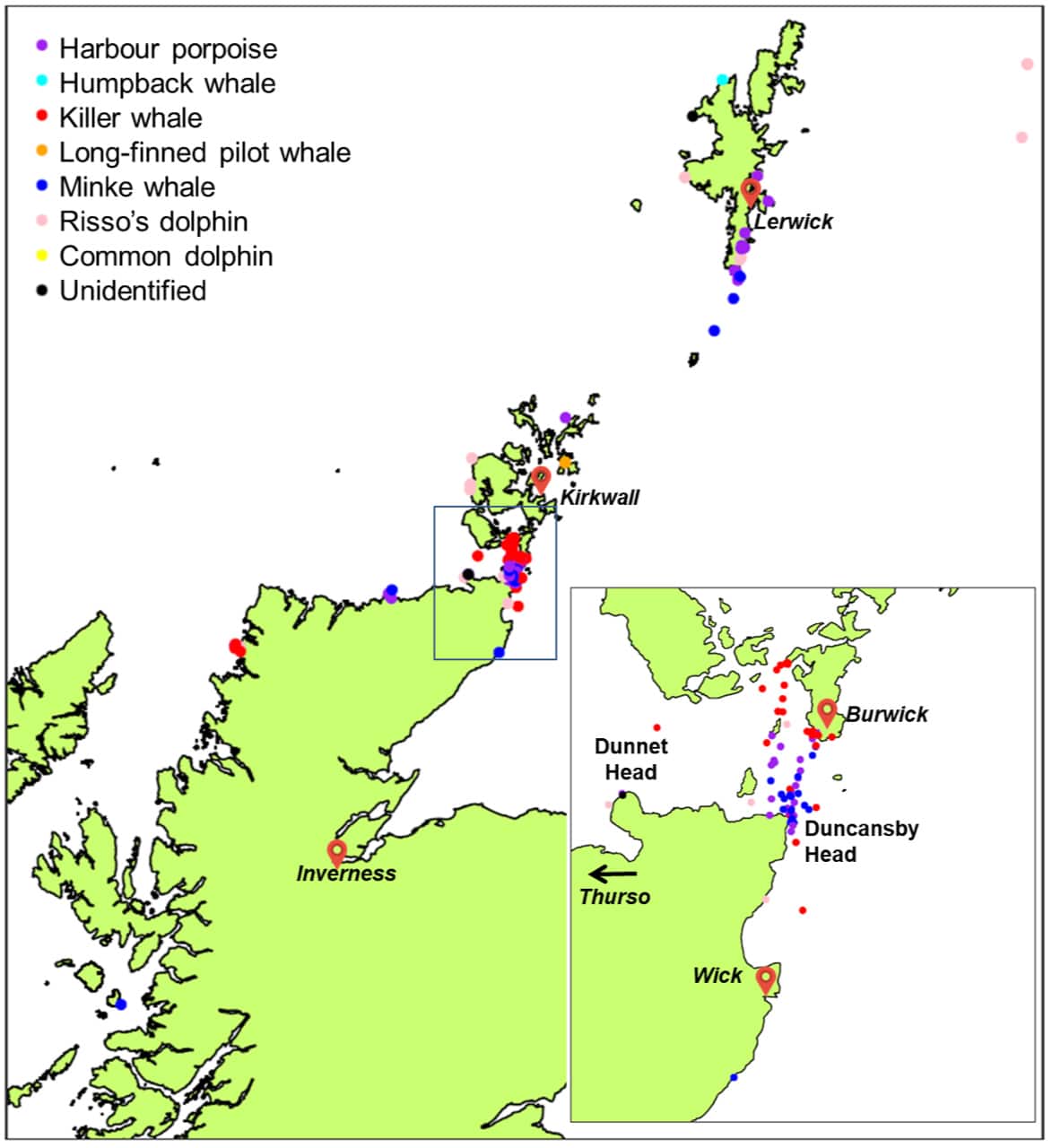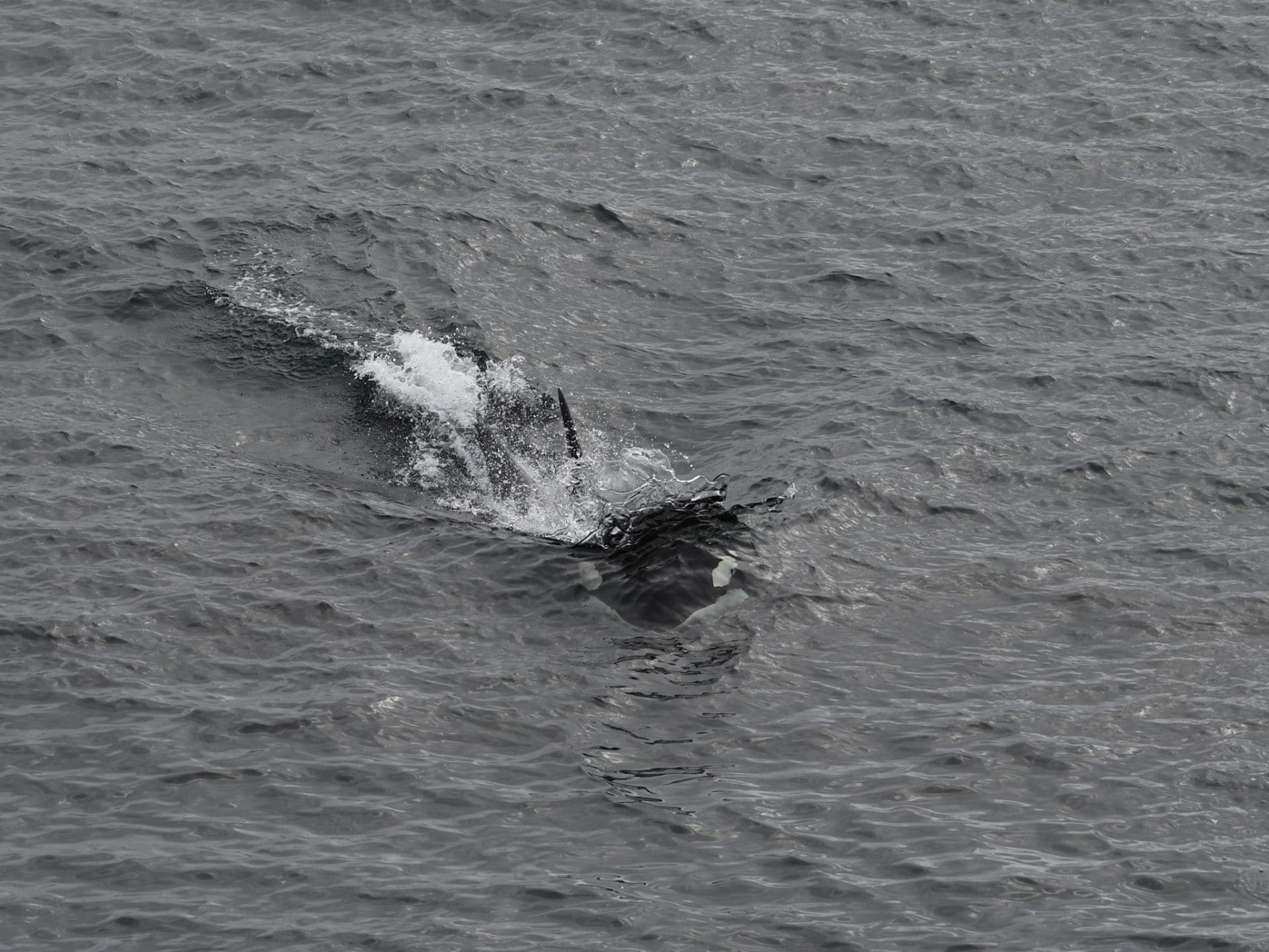Marine Life & Conservation
Unprecedented effort to protect Orcas with citizen science: the 2019 Orca Watch event results are out!

![]() For ten days in late May, tourists, wildlife enthusiasts and local businesses around Caithness, Orkney and Shetland support Orca Watch, a citizen science project organized by the Sea Watch Foundation now in its 8th year, hoping to catch a glimpse of killer whales otherwise known as orcas, and any other species of cetacean (whale, dolphin and porpoise) visiting the waters of the Pentland Firth.
For ten days in late May, tourists, wildlife enthusiasts and local businesses around Caithness, Orkney and Shetland support Orca Watch, a citizen science project organized by the Sea Watch Foundation now in its 8th year, hoping to catch a glimpse of killer whales otherwise known as orcas, and any other species of cetacean (whale, dolphin and porpoise) visiting the waters of the Pentland Firth.
They stand endlessly from cliff tops and from the John O’Groats ferry decks, collecting sightings, behaviour, geographical positions and photographs of orcas and any other cetacean species which passes by.
The idea of organizing this event started with Colin Bird, Sea Watch’s long-standing Regional Coordinator for North-East Scotland, and was influenced by concerns over the possibility of underwater turbines installed in the Pentland Firth. This initiated the first seasonal watch in 2012 to gather information on how orcas use this area and what might be the consequences of such an installation.
“Without knowing how orcas or other cetaceans use the Pentland Firth, or which role they play in the ecosystem in the area, it is impossible for scientists and conservationists to know how to develop plans to protect them” says Dr Chiara Giulia Bertulli, Sightings Officer and lead organizer of this year’s Orca Watch event.
The Sea Watch Foundation in collaboration with eight other organizations (Whale and Dolphin Conservation, Scottish Natural Heritage, John O’Groats Ferries, Pulteneytown People’s Project, RSPB Orkney, Sanday Development Trust, High Life Highland Countryside Rangers, and the Hebridean Whale and Dolphin Trust) aims to change that with a research project that enlists the help of citizen scientists from all around Scotland and its offshore Isles.
During the 2019 Orca Watch, hundreds of volunteer observers spent almost 200 hours (100 more than in 2018) collecting 122 sightings of seven different cetacean species, stationed at 30 land watch sites (main site at Duncansby Head, Caithness) and aboard one vessel (operated by the John O’Groats Ferries) around Caithness, Orkney, and Shetland. Orca sightings were also sent in from the west coast of Scotland and the Hebrides.

LOCATIONS OF CETACEAN SIGHTINGS (N=122) COLLECTED DURING THE 2019 ORCA WATCH EVENT (MAY 17-26). COPYRIGHT: SEA WATCH FOUNDATION.
Species seen includes orca, Risso’s dolphin, humpback whale, harbour porpoise, short-beaked common dolphin, minke whale, long-finned pilot whale.
“This looks like being the best Orca Watch event of the last few years”, reported Dr Chiara Giulia Bertulli.
Harbour porpoises were the most commonly sighted species during Orca Watch. This species was recorded 46 times (38% of all records).
The Orcas were the second most commonly sighted species during Orca Watch, with 27 sightings (22%). Groups varied in size from a single individual to a group of 10 with an average group size of 3. Sightings were distributed around Orkney and Caithness, with few sightings also reported from Sutherland (Handa Island) and from the Outer Hebrides (Isle of Lewis). Orcas were first spotted on May 17st from Hoxa Head (Orkney) and on May 19th they were sighted off both Handa Island and Gary Beach, Isle of Lewis. On May 20th they were sighted from three different location around Orkney (Buwick, Hoxa Head, Lidell) and then in Caithness on May 21st during the morning ferry ride onboard the Pentland Venture (John O’Groats Ferries). After two days of bad weather and no further sightings morale seemed low. However at dusk on May 24th they were finally sighted at the Stacks of Duncansby and remained in the area through May 25th and 26th. Two known orcas were also sighted on May 26th from Burwick and Duncansby and from onboard the John O’Groats ferries. They are commonly referred to as “Hulk” and “Nótt”, which are orcas that are known to travel between Iceland and Scotland on foraging trips.
Minke whales were the third most abundant species recorded during Orca Watch, with 26 sightings being made, accounting for 21% of all records.
“Never in my wildest dreams did I imagine it would be that amazing! – spending the whole day watching them swimming off Hoxa Head as the light started to fade was something I am not going to forget easily” said Christina Worth, a Sea Watch Volunteer Observer, who sighted the orcas during her land-watch off Hoxa Head.
“Other interesting sightings from this year’s Orca Watch week included a humpback whale sighted off Nista Skerries, Uyea, a lone common dolphin encountered on May 21st off Gletness, Shetland, and many close encounters with minke whales sighted off Duncansby Head”, added Chiara.
“We are very pleased with the amount of information we have gathered during this year’s Orca Watch and our immense gratitude goes to our lead volunteer organizers from all of the groups (particularly Anna Jemmett, Lucy Baldwin, Steve Truluck, Rob Lott, Karen Hall, Emma Neave-Webb, Colin Bird, and Karen Munro), to all our network of volunteer observers, regional coordinators, to our partners and to all the local businesses that have pitched in, offered generous discounts and taken great care of all our Orca Watchers”, concluded Chiara.
For more information on the work of the Sea Watch Foundation visit their website by clicking here.
Marine Life & Conservation
Paul Watson Released as Denmark Blocks Japan’s Extradition Bid

Renowned anti-whaling activist Paul Watson has been released from custody in Greenland after spending five months in detention. Denmark’s Justice Ministry rejected Japan’s request for his extradition, citing insufficient guarantees that his time already served in custody would be credited against any potential sentence.
The 74-year-old Canadian-American was arrested on July 21 in Nuuk, Greenland’s capital, when his ship docked to refuel. His arrest was based on a 2012 Japanese warrant related to a 2010 encounter in Antarctic waters. Japan alleged Watson obstructed operations and caused damage to a whaling research ship during efforts to disrupt illegal whaling. Watson has consistently denied these claims, maintaining his commitment to marine conservation.
Denmark, which oversees extradition matters for Greenland, concluded that while the legal conditions for extradition were met, the lack of assurances from Japan regarding time-served credit made extradition untenable.
In a video shared by his foundation, Watson expressed gratitude and relief, saying, “After five months, it’s good to be out… and good to know they’re not sending me to Japan.” He added that the most difficult part of his time in custody was being separated from his two young sons.
Watson is a pioneering figure in marine conservation, known for founding the Captain Paul Watson Foundation in 2022 after decades of activism with the Sea Shepherd Conservation Society. His bold efforts to defend marine life have earned him widespread support, including from celebrities and conservationists. His work has also been featured in the acclaimed reality TV series Whale Wars.
Watson’s lawyer, Jonas Christoffersen, praised the decision, stating, “We are happy and relieved that Paul Watson is now free.” He added that Watson is eager to reunite with his family and continue his vital work.
The arrest occurred while Watson’s vessel, the M/Y John Paul DeJoria, was en route to the North Pacific with a team of 26 volunteers to intercept a Japanese whaling ship. His foundation described the arrest as politically motivated and emphasized that Watson’s actions were focused on ending illegal whaling practices.
Japan resumed commercial whaling in 2019 after leaving the International Whaling Commission, asserting that whale meat is a cultural tradition. Conservationists, however, continue to challenge these practices, highlighting their impact on marine ecosystems.
Despite the challenges, Watson remains steadfast in his mission to protect marine life and bring attention to whaling practices. His dedication to ocean conservation has made him a globally respected advocate for the environment.
Marine Life & Conservation
12 Days of Zero-Waste Fish-mas

This holiday period, the Marine Conservation Society, the UK’s leading ocean membership charity, invites you to make some simple changes to eating fish this Christmas to help our seas.
Dr Kenneth Bodles, Head of Fisheries and Aquaculture at the Marine Conservation Society, said, “During the festive season, our consumption increases, but so does waste. Sustainability isn’t just about where food comes from – it’s also about how you use it. By reducing waste and making the most out of your seafood, you’re not only taking steps to be more ocean-friendly, but can also help to cut costs during what is often one of the most expensive times of the year”.
The Marine Conservation Society has compiled twelve tips on how to consume seafood sustainably with zero-waste this Christmas:
Buy whole fish instead of fillets
Instead of fillets, consider buying whole fish such as salmon, hake, or lemon sole. By adopting a “nose to tail” approach with cooking, whole-baked fish not only feeds a crowd, but also helps to minimise waste and maximise sustainability by using up every part of the animal, including bones, skin, and fat.
Make fish stock
Leftover fish bones or shells can be put to good use by boiling them to make a nourishing fish stock or bisque. This can be frozen and preserved for later use and makes for a flavourful base in a soup.
Make your own fish pâté
Avoid waste by turning leftover fish, such as smoked mackerel or salmon, into a delicious pâté by blending with cream cheese and lemon. Perfect when paired with crackers.
The sustainability of salmon and mackerel varies depending on where and how it is caught or farmed. For more information on green-rated options, check the charity’s Good Fish Guide.
Buy frozen
By purchasing seafood that is frozen or vacuum-packed, this helps to reduce waste by extending the shelf life of your food.
Fish pie
If you’re wondering what to do with leftover cooked fish, why not opt for a classic fish pie with mashed potatoes, leeks, and a cheesy sauce? A sure crowd pleaser on Boxing Day.
Use the head
Don’t forget the fish head! The meat is incredibly tender and flavourful. The charity recommends a cod’s head curry or recreating Fallow’s renowned cod’s head in siracha butter.
By stretching your ingredients further, not only is this a more sustainable way to enjoy seafood, but also cost-effective by repurposing leftovers and cooking creatively.
Boxing Day brunch
Mix leftover kippers or smoked salmon with scrambled eggs for a tasty, zero-waste, Boxing Day brunch.
For best choice, make sure you buy kippers, or herring, from the North Sea and the North Irish Sea.
Zero-waste storage
A top tip from the Marine Conservation Society to avoid waste is freezing fish offcuts to save for future use.
Crisp up the skin
Even leftover fish skin can be turned into a quick savoury snack by crisping it up in an air fryer with a little olive oil and salt.
Anchovies two ways
Leftover anchovies can either be blended with butter to make a delicious anchovy butter or tossed into pasta for a hit of umami flavour.
The charity recommends opting for anchovies caught in the Bay of Biscay for best choice.
Fishcakes
For an easy, zero-waste meal, leftover seafood trimmings can be mixed with mash and fried in breadcrumbs to make fishcakes.
Pickled mussels
Try pickling mussels in 1:1 vinegar and water, with a dash of sugar for a sustainable, zero-waste snack that can be enjoyed well beyond the festive season.
Mussels farmed in the UK are a seafood superhero. Grown using low-impact methods and harvested by hand, they get all the food they need from the sea around them. This makes them one of the most sustainable, ocean-friendly, and cost-effective seafood options.
Players of People’s Postcode Lottery have raised £6.6M towards the Marine Conservation Society’s vital work in making seafood more sustainable.
Laura Chow, Head of Charities at People’s Postcode Lottery, said: “Fish is a festive favourite for many, but making sustainable choices when it comes to how we buy and eat seafood makes all the difference for our ocean. Support from players of People’s Postcode Lottery has helped the Marine Conservation Society further its sustainable seafood work, so that we can all enjoy healthier, better protected seas.”
The Marine Conservation Society encourages you to make sustainable seafood choices a year-round habit, not just for Christmas. To check how sustainable the seafood on your plate is, you can visit the charity’s Good Fish Guide. The Guide helps consumers and businesses identify the most sustainable seafood using a simple traffic light system, based on where and how species are caught or farmed. Green is the best choice, amber means improvements are needed, and red indicates fish to avoid buying.
Zero-waste gift idea
Why not embrace a zero-waste Christmas by gifting a membership to support marine conservation? It’s a meaningful, low-waste gift that helps protect our ocean for generations to come. Memberships start from as little as £5 a month – the price of a sandwich and drink from your local coffee shop.
Find the latest sustainable seafood advice for wild-caught and farmed seafood on the Good Fish Guide, downloadable to your phone from www.mcsuk.org/goodfishguide.
-

 News3 months ago
News3 months agoIconic SS United States to become the World’s Largest Artificial Reef
-

 Blogs2 months ago
Blogs2 months agoScubaverse Christmas Gift Guide 2024: Day 4
-

 Blogs2 months ago
Blogs2 months agoScubaverse Christmas Gift Guide 2024: Day 1
-

 News2 months ago
News2 months agoSanta Divers take the Plunge for Charity
-

 News3 months ago
News3 months agoDiscover Turquoise Divers and Media Luna Beach & Dive Resort: A Premier Diving and Relaxation Destination in Roatan
-

 Blogs2 months ago
Blogs2 months agoScubaverse Christmas Gift Guide 2024: Day 5
-

 Blogs2 months ago
Blogs2 months agoScubaverse Christmas Gift Guide 2024: Day 2
-

 News3 months ago
News3 months agoToucan Diving at Plaza Beach and Dive Resort Bonaire Introduces PADI Mermaid Training




